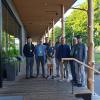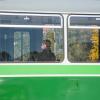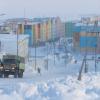1
News

13 September 2023
FLAM Sparks Interest and Conversation at the 2023 IBFRA Conference in Helsinki

30 August 2023
The IIASA Summer Experience: A Blend of Learning and Experience in a nurturing atmosphere

20 April 2023
IIASA Director General visits Canada
Events
Palais des Congrès de Montréal, Québec, Canada hybrid format
IIASA at INGSA Conference 2021: Build Back Wiser: Knowledge, Policy and Publics in Dialogue
Focus

12 August 2021
Warming waters, evolution, and the future for fisheries policy
Young Scientists Summer Program (YSSP) participant Lyndsie Wszola explores how human interactions with warming freshwater systems have affected the evolution of fish species through the lens of the North American walleye.

03 June 2020
COVID19 – Let’s Not Forget the Humans
As Canadian expats in Austria, one of the things that has particularly struck my family and I is the orderliness with which the country is dealing with the pandemic. As quarantine policies were put into place, we saw panic toilet paper hoarding in other countries, but here in Austria people were (amazingly) compliant and seemed to obey instructions and timelines provided by the authorities. We never worried about our basic needs. Grocery stores were always well stocked, public transit was always there and on time – and masks were readily available when required as physical barrier to protect others.
